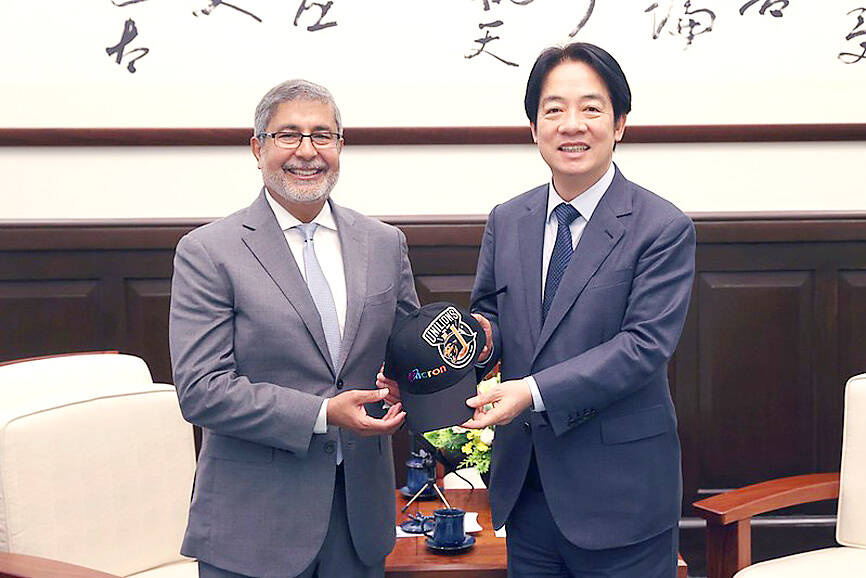President William Lai (賴清德) yesterday thanked memory chipmaker Micron Technology CEO Sanjay Mehrotra for his trust and continued investment in Taiwan, in a rare public meeting with a senior foreign tech executive.
It is very unusual for Taiwan’s president to have publicized meetings with senior foreign tech executives, despite the nation being home to the world’s largest contract chipmaker, Taiwan Semiconductor Manufacturing Co (TSMC, 台積電), whose chips help to power the surge in artificial intelligence (AI) applications.
Lai thanked Mehrotra for “showing trust and support for Taiwan” in a video released by the Presidential Office.

Photo courtesy of the Presidential Office
“I want to thank Micron for its long-term investment in Taiwan and continuing to promote the upgrading of DRAM process technology in Taiwan,” he added.
Micron is one of the few providers of high-bandwidth memory chips used in advanced AI systems.
Taiwan hopes Micron will continue to expand its research and development capabilities, and the government will create a “friendly living environment” for foreign talent to meet the needs of companies, Lai said.
Last year, Micron launched a new facility in Taichung, which accelerated the development and mass production of advanced DRAM technology, as well as spurring supply chain localization, Lai said in a statement published on the Presidential Office Web site.
With Micron working side by side with Taiwan, the nation’s semiconductor industry has secured a pivotal global role, he said.
Moving forward, the government will continue developing the semiconductor industry and accelerate Taiwan’s transformation into an AI island, he said.
“It’s an honor to meet with you today,” Mehrotra told Lai.
Micron did not immediately respond to a request for comment.
Lai’s meeting with Mehrotra was not previously announced in the president’s official schedule, which is sent to reporters.

In Italy’s storied gold-making hubs, jewelers are reworking their designs to trim gold content as they race to blunt the effect of record prices and appeal to shoppers watching their budgets. Gold prices hit a record high on Thursday, surging near US$5,600 an ounce, more than double a year ago as geopolitical concerns and jitters over trade pushed investors toward the safe-haven asset. The rally is putting undue pressure on small artisans as they face mounting demands from customers, including international brands, to produce cheaper items, from signature pieces to wedding rings, according to interviews with four independent jewelers in Italy’s main

Japanese Prime Minister Sanae Takaichi has talked up the benefits of a weaker yen in a campaign speech, adopting a tone at odds with her finance ministry, which has refused to rule out any options to counter excessive foreign exchange volatility. Takaichi later softened her stance, saying she did not have a preference for the yen’s direction. “People say the weak yen is bad right now, but for export industries, it’s a major opportunity,” Takaichi said on Saturday at a rally for Liberal Democratic Party candidate Daishiro Yamagiwa in Kanagawa Prefecture ahead of a snap election on Sunday. “Whether it’s selling food or

CONCERNS: Tech companies investing in AI businesses that purchase their products have raised questions among investors that they are artificially propping up demand Nvidia Corp chief executive officer Jensen Huang (黃仁勳) on Saturday said that the company would be participating in OpenAI’s latest funding round, describing it as potentially “the largest investment we’ve ever made.” “We will invest a great deal of money,” Huang told reporters while visiting Taipei. “I believe in OpenAI. The work that they do is incredible. They’re one of the most consequential companies of our time.” Huang did not say exactly how much Nvidia might contribute, but described the investment as “huge.” “Let Sam announce how much he’s going to raise — it’s for him to decide,” Huang said, referring to OpenAI

The global server market is expected to grow 12.8 percent annually this year, with artificial intelligence (AI) servers projected to account for 16.5 percent, driven by continued investment in AI infrastructure by major cloud service providers (CSPs), market researcher TrendForce Corp (集邦科技) said yesterday. Global AI server shipments this year are expected to increase 28 percent year-on-year to more than 2.7 million units, driven by sustained demand from CSPs and government sovereign cloud projects, TrendForce analyst Frank Kung (龔明德) told the Taipei Times. Demand for GPU-based AI servers, including Nvidia Corp’s GB and Vera Rubin rack systems, is expected to remain high,